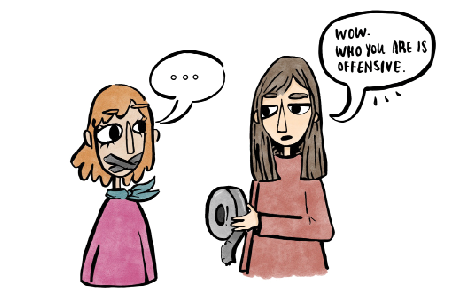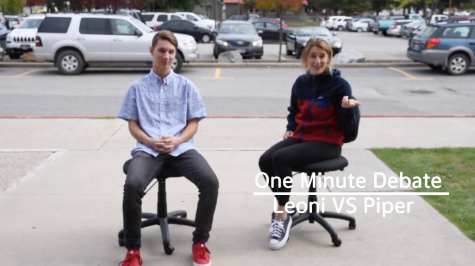SENSITIVITY SYNDROME
Being too quick to take offense limits constructive conversations

As a child most of us are taught the golden rule: treat others the way you would want to be treated.
In reality, it can be hard (or sometimes impossible) to please everyone in a room, and 2018 is no exception.
With every remote backstep or forward movement we make, there is undoubtedly a party in affront. This begs the question: Do people in today’s society too often take offense?
One prime example of our “delicate” society can be seen in the creation of safe spaces.
The idea of creating an environment where people are safe from abuse and allowed to voice their opinions started with noble intent. However, the expectation that safe spaces create is too demanding
to uphold.
A safe space can be counterproductive: Safe spaces eliminate challenging viewpoints, and rather preserves the idea that it’s necessary to be “emotionally shielded” at all times.
Being an integral part of society means learning to deal with disagreement.
If people are never exposed to confrontation because they’re afraid they may be offended by someone else’s differing viewpoints, then society would never advance.
A more recent example of controversy was sparked just a few weeks ago when H&M launched one of its new clothing lines for children. One of its models, Liam Mango, a young black boy was photographed wearing a shirt that said “coolest monkey in the jungle.”
Many took offense to this, as the word “monkey” was traditionally used as a racial slur. South African customers began boycotting the company’s products and some even went as far as ransacking H&M stores.
Though many felt that their actions were justified, the model’s mother Terry Mango spoke out to defend the company. “I know racism exists, but does the shirt to me speak racism? No, it doesn’t.” Mango said to BBC.
Now facing backlash, the family was forced to move out of their current home due to security reasons.
By no means should discriminatory actions be taken lightly, and people have every right to feel offended by H&M’s insensitivity. Yet, is expressing offense via destroying property and issuing threats the only viable option?
If we turn to this method of blatant destruction, then we’re no better than the party that evokes offense.
Today’s society has become susceptible to being baited by anything considered remotely offensive.
While not every reaction is unwarranted, the idea that any confrontation should result in mass offense and criticism is unjust.
If we set limits on what can be said out of fear that it may elicit a negative response, then we’re restricting our fundamental rights.
By no means should we begin to revert to a state of unbridled crass, but we also shouldn’t be forced into a state dictated by the fear of how others may react.











